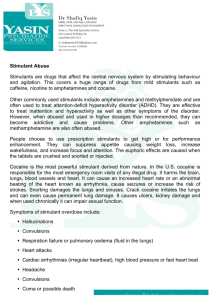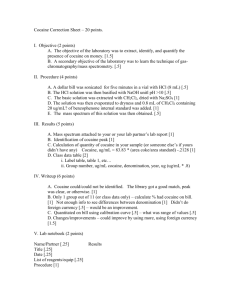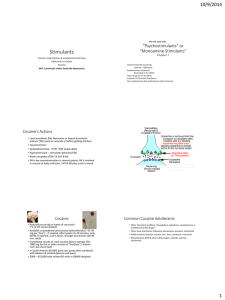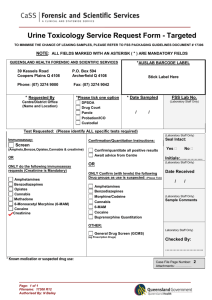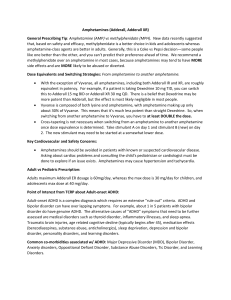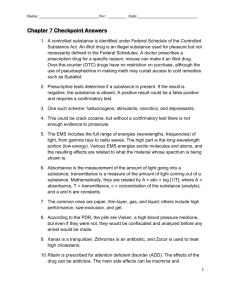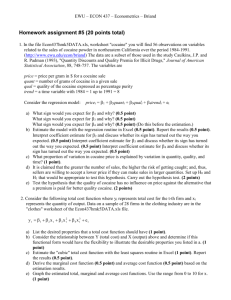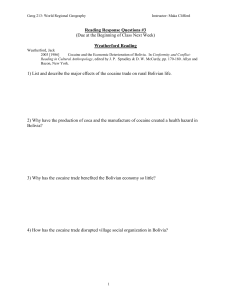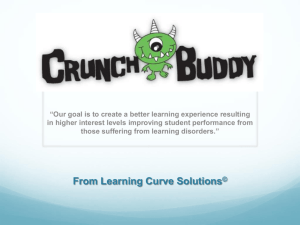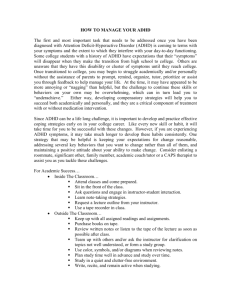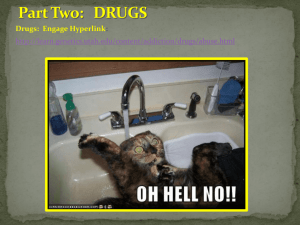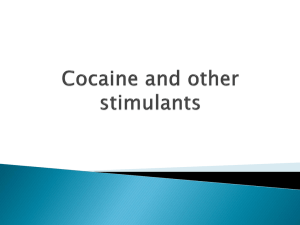Cocaine, Amphetamines, and Other Behavioral Stimulants
advertisement
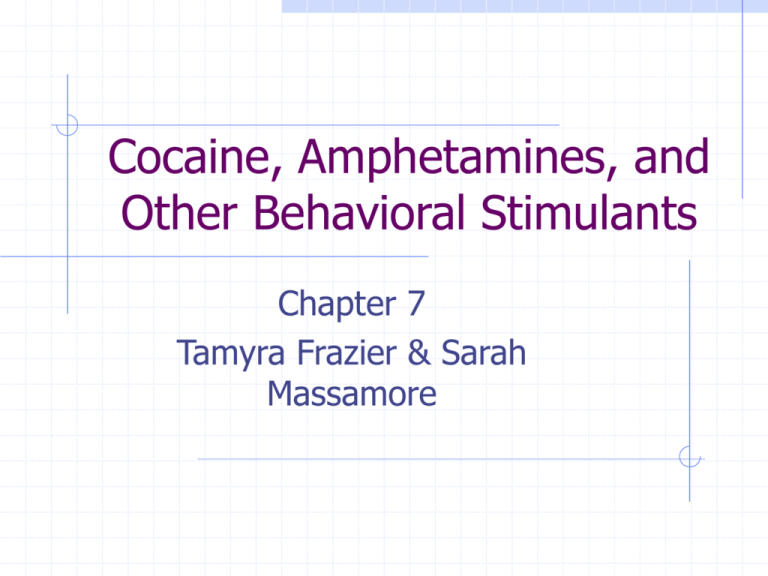
Cocaine, Amphetamines, and Other Behavioral Stimulants Chapter 7 Tamyra Frazier & Sarah Massamore Comparison Powerful psychostimulants that markedly affect one’s mental functioning and behavior They augment the synaptic action of several neurotransmitters (dopamine, norepinephrine, and serotonin) Widely known as drugs of abuse What is Crack? What is ICE? Crack is a streetname for a smokeable form of potent, concentrated cocaine. ICE is a streetname for a smokeable, freebase form of potent, concentrated methamphetamine. The three major actions of cocaine It is potent local anesthetic It is a vasoconstrictor, strongly constricting blood vessels It is a powerful psychostimulant with strong reinforcing qualities The effects of cocaine and a fetus: Direct organ toxicity can involve the heart, the CNS, the urinary system and the GI tract. Increase blood pressure in the fetus which leads to intracerebral hemorrhage, thickening of the heart muscle and various vascular and structural abnormalities Destructive lesions on the brain which causes neonatal neurological problems The behavioral states observed in high-dose amphetamine users: Stereotypical behaviors include continual, purposeless, repetitive acts, sudden outburst of aggression and violence, paranoid delusions and severe anorexia The effects of amphetamines on neurotransmission, neurotransmitters and the CNS reward system. Exert all their CNS effects by causing the release of newly synthesized norepinephrine and dopamine from presynaptic storage sites in nerve terminals. Why use amphetamine like drugs in treating adults, children and adolescents with ADHD? It is used to reduce aggressive behavior and activities characteristic of ADHD in children and in adults behavioral calming can also occur. What is meant by the phrase “Speed kills”? It refers not only to a direct fatal effect of single doses of amphetamines but also to the deteriorating mental and physical condition that occurs in the addicted user What is Modafinil? How does is differ from amphetamines and what are its potential uses? It is a nonamphetamine psychostimulant whose exact mechanism of psychostimulant action remains unclear, but is unique. It may potentiate excitatory glutamate neurotransmission and inhibit the activity of GABA neurons in the cerebral cortex and the nucleus accumbens, altering the balance between glutamate and GABA transmission. Potential uses of Modafinil: Cognitive improvement in patients with Alzheimer’s disease Use in treatment of ADHD Potentiation of the action of anitdepressant drugs Issues and Therapeutic Approaches to Cocaine Dependency Intensity of both the drug effect and the intense behavior-reinforcing action of cocaine. Pronounced tendency toward relapse, with cocaine-related activities as a cue to an increased craving for the drug. Most cocaine addicts have a coexisting disorder; involving drug dependencies and/or psychiatric disorders (major depression, anxiety disorder, bipolar disorder, borderline personality disorder and/or antisocial personality disorder. Treatment Approaches to Cocaine Dependency: Antiwithdrawal agents intended to restore or enhance the dopaminergic tone of hypoactive limbic system regions. Such agents might be beneficial to ameliorate withdrawal depression. Anticraving agents that block limbic dopaminergic receptors may either reduce cue-induced craving or blunt the euphoric effect of subsequently administered cocaine. Treatment of comorbid psychological disorders may help reduce the drive that propels a person to selfmedicate with cocaine to ameliorate psychological distress. Treatment Approaches to ADHD The management of treatment-resistant youths. The combination of drugs in ADHD management. The management of adults with ADHD and comorbid substance abuse. Treatment Approaches to ADHD Stimulant Drugs are used primarily used and include drugs such as methylphenidate, amphetamines, and pemoline; other drugs such as buspirone (BuSpar) and bupropion (Welbutrin) are used in refractory cases. Methyphenidates have a rapid onset and short duration when compared to amphetamines such as dextroamphetamine (Dexedrine) and amphetamine mixture (Adderall). Sometimes there are treatment alternative such as antidepressants (Prozac, BuSpar and Welbutrin) Carbamazepine (Tegretol), catecholamine agonists (Clonidine) and guanfacine (Tenex) also are effective.
